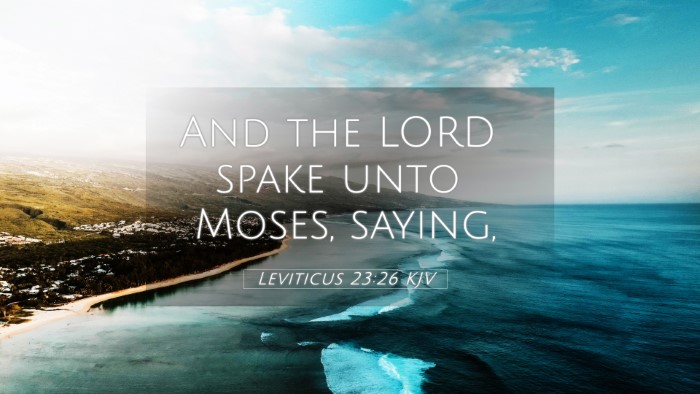Understanding Leviticus 23:26
Leviticus 23:26 states, "And the Lord spoke to Moses, saying,". This verse introduces the command regarding the Day of Atonement, a significant event in the Hebrew calendar, which is described in the verses that follow. The context underlines God's desire for His people to observe this sacred occasion as a time of reflection, repentance, and reconnection with Him.
Verse Meaning and Context
This verse emphasizes God's direct communication with Moses, underscoring the relationship between God and His chosen leader. The whole chapter revolves around the sacred feasts and appointments, illustrating the importance of worship and observance in the lives of the Israelites. Matthew Henry points out that this moment was crucial, as it laid the foundation for understanding the significance of atonement in their spiritual lives.
Theological Insights
- Divine Communication: This is a clear instance of God instructing His people. Albert Barnes notes that such direct communication highlights the authority of God's commands.
- Significance of Atonement: Adam Clarke expounds on the Atonement's importance, indicating that it serves as a precursor to the New Testament understanding of Christ's sacrifice.
- Covenantal Reminders: The rituals outlined further the themes of covenant, forgiveness, and holiness, ensuring that the Israelites remain mindful of their relationship with God.
Cross References
Leviticus 23:26 can be linked to various Bible verses that enhance our understanding of its themes. Here are some relevant cross-references:
- Leviticus 16:30: This verse speaks directly about the Day of Atonement and its necessity for the forgiveness of the people’s sins.
- Hebrews 9:22: Highlights the necessity of blood for the remission of sins, connecting the themes of sacrifice in both the Old and New Testaments.
- Exodus 30:10: Discusses the significance of the atonement money, representing the theme of redemption in the law.
- Psalm 51:9: A call for God to hide His face from our sins, echoing the theme of repentance during the Day of Atonement.
- Isaiah 53:5: The prophecy about Christ's suffering for our transgressions resonates with the concept of atonement.
- Romans 3:25: Discusses faith in Christ’s blood as a means of atonement, connecting back to the sacrificial system of the Old Testament.
- 1 John 1:9: Emphasizes confession and the promise of forgiveness, paralleling the intent behind the Day of Atonement.
- Colossians 1:20: Speaks on peace through the blood of Christ, relating to the themes of reconciliation found in Leviticus.
- Matthew 5:23-24: Jesus discusses reconciliation before offering gifts at the altar, which ties back to the spirit of the Atonement.
- Acts 17:30: Paul’s declaration of God commanding all men to repent reflects the ongoing call for atonement from sin.
Thematic Connections
The themes of Leviticus 23:26 touch upon several key spiritual concepts:
- Repentance: The necessity for acknowledging one’s sins and the desire to seek forgiveness.
- Holiness: The importance of living a life set apart, in accordance with God's commands.
- Community Worship: The corporate nature of the celebrations reflects the communal aspect of faith.
- Divine Instructions: Indicative of how God guides His people towards righteousness.
Comparative Bible Verse Analysis
Through a comparative analysis of related verses, we can observe the continuous thread of God’s intentions for His people regarding atonement and worship. The linkages between Old Testament observances and the New Testament revelations of Jesus Christ deepen our understanding of how God's plan unfolds through scripture.
Exploring Cross-Referencing Methods
Using tools for Bible cross-referencing can greatly enhance the study of verses like Leviticus 23:26. A Bible concordance can help to identify themes and words that connect various scriptures. Furthermore, the process of detailed cross-referencing between the Gospels and looking at correlating themes in the epistles can illuminate the transformative nature of God's covenant through Christ.
Conclusion
Leviticus 23:26 serves as more than just an instructional verse; it is the gateway to understanding rich themes of atonement, divine communication, and holiness revealed throughout Scripture. By engaging with related texts and employing cross-referencing techniques, believers can find deeper meaning and application in their spiritual journeys.


